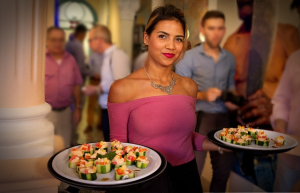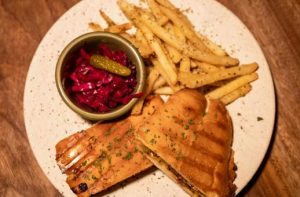マイアミの思い出!地元キャスター「お母さんの手料理」は驚きの美味しさ!
 イメージ
イメージ
WBC優勝のマイアミの思い出!
NO9 地元キャスターの「お母さんの手料理」は驚きの美味しさ!
そして、私とキャスター2人(ツーサム)の楽しいゴルフが終わった時に
彼からちょっとサプライズがありました。
それは、 「俺の家は近くだから 帰りに自宅に寄っていかないか?」と言う
言葉でした。
私は、少し戸惑いましたが、マイアミの人気「ニュースキャスター」の自宅を
訪問できる機会はめったにないので、すぐに「了解!喜んで!」と
答えました。
それから、彼の車で自宅に向かいました。
彼の自宅は、住宅街にある、瀟洒な一部二階建ての一軒家でした。
アメリカ、マイアミらしく、前庭が広く、芝生が緑で綺麗でした。
「さすが~、ニュースキャスター!」と思いました。
玄関ドアは 飾り窓のついた白い重厚なドアでした。
 イメージ
イメージ
そして、部屋に入ると広いリビングルームがあり、
綺麗なテーブルとソファーがありました。
私は、以前見たアメリカ映画の「ワンシーン」の様に感じました。
すると、彼のお母さんがやってきて、「ようこそ」と挨拶してくれました。
そして、「今から夕食を作るのでよければ 食べていってください」と
話してくれました。
私は、少し驚きましたが、すぐ「よろしくお願いします。」と答えました。
「なんと~」、キャスターのお母さんの「手料理をいただける事」 に。
私には本当に想定外の嬉しいハプニングでした。
お母さんは色が黒く大柄のぽっちゃり体形で、中南米でよく見かけるような
お世話好きの「おばさん」タイプでした。
お母さんは、性格は優しく、ちょっと「恥ずかしがり屋さん」でした。
お互いぎこちない挨拶から始まりましたが、初対面ながらもリラックスした
感じでお話ができました。
そして、少しお話した後、お母さんはご飯作りに取りかかりました。
この間に、私は、彼から一家の歴史を聞きました。
彼(多分40才?)が小さい頃、両親と共に共産主義の「キューバ」から
移民してきたそうです。
その後家族は、フロリダ州で暮らし、彼はアメリカで民主主義教育を
受けて育ったという事です。
私は この時初めて彼がキューバ出身である事を知りました。
続けて、彼は、「最初は貧しくて社会生活のギャップが大きく戸惑いも
多かったけど、自分なりに必死に勉強しました。
その結果、難関の地元のローカルメディアに入社でき、幸いにも
ニュースキャスターの仕事に就くことができました」との
事でした。
私は、彼はいつも明るく、ジョークを話すので、彼からその過去を聞くまで
「そんな複雑な歴史?」があるとは想像できませんでした。
日本は島国で、海外からの移民の人はほとんどいないのが現実。
このため、私は、こうした海外からの家族ぐるみの移民、現地化についての
知識や経験がほとんどない状況でした。
彼は常に明るく話してくれました。
しかしその反面、その言葉の裏に様々苦労、トラブルがあった様な
気もしました。
本当に島国の日本しか知らない私には、
世界のリアルな現実を知る事ができた一瞬だったと思います。
その他、彼はゴルフの最中には聞けなかった、日常生活や仕事の事などを
いろいろ話をしてくれました。
また、「日本人とこんなには話すのは初めてです!」とも。
 イメージ
イメージ
そして、1時間ほど過ぎた頃、お母さんが笑いながら
「できましたよ~」と声をかけてくれました。
キッチンに移動すると、テーブルにお母さん手作りの「キューバ料理」が
たくさん並んでいました。 郷里のごく普通の家庭料理という説明でした。
そして、お母さんは 日本人に手料理を食べてもらうのは初めてなので
「お口に合うかどうか?ちょっと緊張するわ~」と言いました。
私が、まず、目についたのがキューバ料理の定番「アロス・ア・ラ・マリネーラ」。
これは、スペインの料理としても有名なパエリアに似たグルメです。
味はパエリアとは少し違いました。
キューバは、魚の出汁(だし)をお米に染み込ませた様な味付けが
大きな魅力の1つです。
日本流に言えば「チャーハン」で、味付けは少し塩が効いた感じでした。
日本の家庭料理とよく似ていたので、全く違和感なく、
私は本当に美味しくいただきました。
次は、キューバ料理の定番メニュー「ビステク」。
数ミリの厚さに薄切りされたお肉を塩だけで味付けして焼いた料理です。
キューバはお肉も素材が良いので、こうしたシンプルな味付けでも
肉の旨みを楽しむことができました。
 イメージ
イメージ
この他にも、私には「初物」(初めてみる)手料理をたくさん作ってくれましたが、
途中で満腹でギブアップ状態となりました。
私は「サンキュー、ソーマッチ」とうれしい悲鳴をあげました。
彼とお母さんは大きく笑っていました。
外食が続いたアメリカでの単身生活の中で、
このひと時はとてもフレンドリーで温かく家庭的で、心が癒されました。
拙い英語で簡単な会話しかできませんでしたが、
「国や人種を超えた人と人とのふれあいはこういう事なのだ!」と実感し、
感動しました。
ほんの一瞬、ですが、リアルアメリカを体験できて、
「来て本当によかった!」と思いました。
この時は……。
続く! 圧倒された「おばちゃんパワー!」
Memories of Miami, the WBC Champion!
NO9 The local anchor’s “mother’s cooking”
was amazingly delicious!
And when the fun golf game between myself and
two casters (two-some) were over.
He had a little surprise for me.
He said, “I live close by,
so why don’t you come by my house on your way home?”
I was a little confused,
but it was a rare opportunity to visit the home of
a popular Miami news anchor.
So, I immediately said, “Sure! I’d love to go!” I replied.
Then I got in his car and drove to his house.
His house was an elegant two-story house in
a residential area.
The front yard was large, and the lawn was green and beautiful,
just like in Miami, USA.
I thought to myself,
“This is the house would expect from a news anchor! “
The front door was a massive white door with
a decorative window.
 image
image
When I entered the room, I found a large living room with
a beautiful table and sofa.
I felt like it was in a scene from an American movie I had seen.
Then his mother came in and greeted me,
saying, “Welcome.”
She said, “I am going to cook dinner for you now.”
I was a little surprised, but immediately replied,
“Thank you very much.”
I replied, “Oh, my God!”
What a surprise!
I was to receive (eat) a home-cooked meal
from Castor’s mother.
It was a truly unexpected and delightful happening for me.
The mother was slight black, large, and chubby,
the type of “auntie” you often see in Central and
South America.
The mother had a gentle personality and was a bit “shy.”
We started with an awkward greeting,
but we were able to talk in a relaxed manner even though
we were meeting for the first time.
We talked for a while.
Then, after a short chat, the mother started to cook dinner.
During this time, I asked him about his family history.
He (40 years old?) told me that he and his parents immigrated
from communist “Cuba”
when he was a little boy.
Since then, the family then lived in Florida,
He was raised in the U.S.
where he received a democratic education.
This was the first time I learned that he was from Cuba.
He continued, “At first,
I was poor and there was a lot of confusion because of
the gap in social life.”
“But I studied hard in my own way.
As a result, I was able to work in a local media.
It was so difficult to get into a media,
but fortunately, I was able to get a job as a newscaster.”
He was always cheerful and cracked jokes.
Then, when he told me about his past,
I could not imagine that he had such a complicated history.
The reality is that Japan is an island nation with
very few immigrants from abroad.
For this reason, I had little knowledge or experience with
such family-based immigration and localization from overseas.
He always spoke cheerfully, like “never mind.”
However, on the other hand,
There were various hardships and
troubles behind his words.
It was a moment when I was able to know the real reality of the world.
He also told me many other things about his daily life and
work that I could not ask him during the golf play.
He also said,
“Before I have never talked with a Japanese person. “
 image
image
After an hour or so, his mother laughed and said,
“It’s ready!”
When we moved to the kitchen, we found many of her homemade
“Cuban dishes” lined up on the table.
She explained that they were very ordinary home-style dishes from
hometown.
As it was the first time for her to have a Japanese person
try her homemade cooking,
she was worrying about whether it will suit your taste or not.
She was a little nervous!
The first thing I noticed was “arroz a la marinera,”
a traditional Cuban dish.
This is a gourmet dish like paella, a well-known Spanish dish.
The taste was slightly different from paella.
In Cuba,
the flavor is like fish stock (dashi) soaked into the rice.
This is one of the main attractions of Cuban cuisine.
In the Japanese style, it is called “fried rice,”
and the seasoning was a little salty.
It was remarkably similar to Japanese home cooking,
so, I did not feel at all uncomfortable.
I really enjoyed it.
Next was “bistek,” a classic Cuban dish.
It is a dish of thinly sliced meat a few millimeters thick,
seasoned only with salt, and grilled.
Since Cuban meat is made from good ingredients,
I was able to enjoy the flavor of the meat even with such
a simple seasoning.
 image
image
In addition to these dishes,
she cooked many “firsts” (things I had never seen before) for me.
But unfortunately,
I was so full, I gave up halfway through the meal,
I said to her, “Thank you, so-much!”
He and his mother smiled broadly.
In my single life in the U.S., where I had been eating out,
this moment was very friendly.
And it was warm, homey, and comforting.
I could only have a simple conversation with them
in terrible English.
I realized that this is what it means to be in contact with
people beyond nationality and race,
and I was moved by the experience.
I am so glad that I came to the U.S.
because I was able to experience the real America,
even if only for a moment.
Truly I am so glad I came!
At that time, …….
To be continued!
I was overwhelmed by the “power of the mother!”

